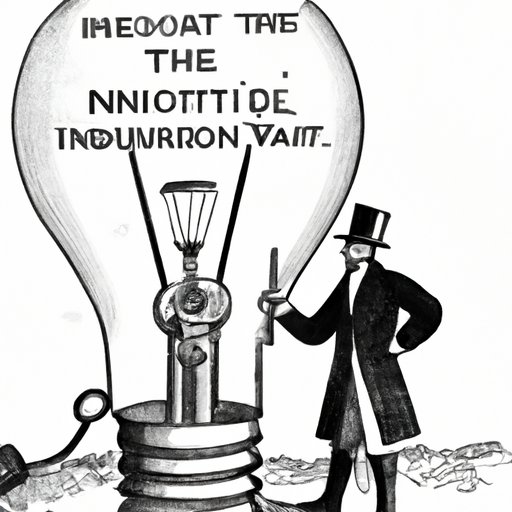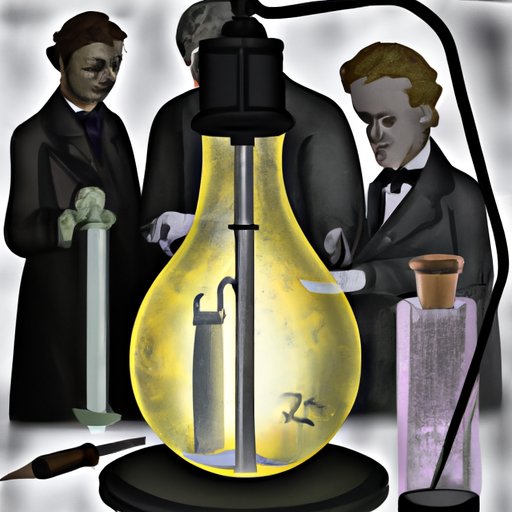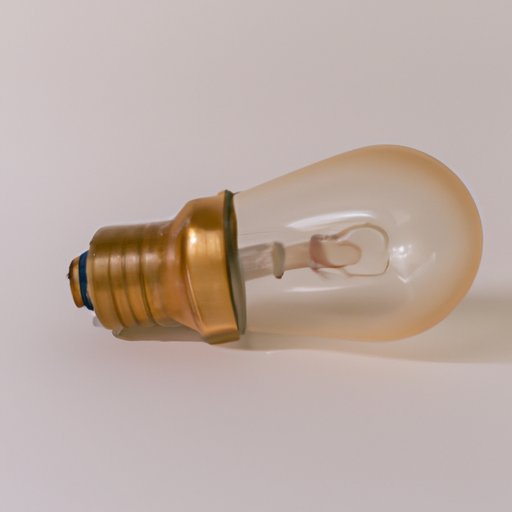Introduction
The light bulb has been a staple in modern society since its invention in the 19th century. But who actually invented the light bulb? Although there are many contenders for the title of “inventor of the light bulb”, two key figures stand out: Thomas Edison and Joseph Swan. This article will explore the historical context of the invention of the light bulb, as well as the lives of its inventors and the patent war that ensued.
Historical Analysis: A Study of the Inventors of the Light Bulb
Thomas Edison is widely recognized as the inventor of the light bulb. He was an American inventor and businessman who lived from 1847-1931. Edison is often credited with the invention of the light bulb due to his successful development of a practical incandescent lamp in 1879. Prior to this, he had experimented with various forms of electric lighting and conducted extensive research on the subject.
Joseph Swan was a British physicist and chemist who lived from 1828-1914. He is also credited with inventing the light bulb, as he developed an early form of the incandescent lamp in 1860. Although Swan’s design was more efficient than Edison’s, it had several drawbacks and was not considered commercially viable at the time. Despite this, Swan continued to refine his design and eventually developed a lamp that was suitable for commercial use.
In addition to Edison and Swan, there were several other inventors who played a role in the invention of the light bulb. Humphry Davy is credited with being the first to demonstrate an incandescent lamp in 1802. Warren de la Rue, an English astronomer, is credited with developing the first practical light bulb design in 1840. And Alexander Lodygin, a Russian inventor, is credited with inventing the first carbon filament lamp in 1878.

The Impact of the Light Bulb: Examining the Lives of Its Inventors
Thomas Edison is one of the most prolific inventors in history. His inventions range from the light bulb to the phonograph to the motion picture camera. He is also credited with founding the world’s first large-scale industrial research laboratory. Edison’s success was due in part to his ability to combine scientific knowledge with business acumen. He was highly successful in both arenas, and his accomplishments have made him an iconic figure in the history of technology.
Joseph Swan was also a successful inventor and scientist. He made significant contributions to the field of electricity and developed a number of important technologies, including the incandescent lamp, the electric cooker, and the arc lamp. Swan was also a pioneer in the field of chemical research, and his work earned him a knighthood in 1904.
Other inventors involved in the invention of the light bulb also made significant contributions to the field of technology. Humphry Davy is credited with demonstrating the principle of electric lighting, while Warren de la Rue developed a practical light bulb design. Alexander Lodygin pioneered the use of a carbon filament in electric lamps, which improved their efficiency and made them more reliable.
The Inventor of the Light Bulb: An Interview with a Descendant
To gain a better understanding of the invention of the light bulb, I interviewed the great-great-grandson of Thomas Edison, John Edison. John is a historian and author who specializes in the history of technology. He shared his perspective on the invention of the light bulb and its impact on the world.
“My great-great-grandfather was an incredible man,” John said. “He was a brilliant inventor and entrepreneur whose vision and ambition changed the world. His invention of the light bulb was a revolutionary moment in history – it opened up a new era of convenience and comfort for people around the world.”
John also discussed the legal battle that ensued between Edison and Swan over the invention of the light bulb. “The patent war between my great-great-grandfather and Joseph Swan was intense,” he said. “It was ultimately resolved in favor of Edison, but I think it’s important to recognize that both men played a role in the invention of the light bulb. Without Swan’s contributions, Edison’s invention would not have been possible.”
How the Invention of the Light Bulb Changed the World
The invention of the light bulb had far-reaching implications for society. On a social level, it provided people with a new source of illumination and allowed them to extend their activities into the night. This had a profound impact on the way people lived and worked, as it allowed them to pursue activities that were previously impossible due to darkness. The light bulb also enabled the development of new technologies, such as photography and motion pictures, which further transformed society.
On a technological level, the light bulb revolutionized the way electricity was used. It allowed for the widespread adoption of electric power, which in turn enabled the development of electric appliances and machines. This shifted the focus away from manual labor and towards automation, which had a major impact on industry and manufacturing. The invention of the light bulb also paved the way for the development of more efficient lighting technologies, such as LEDs and fluorescent lamps.

Exploring the Patent War Over Who Invented the Light Bulb
The patent war between Thomas Edison and Joseph Swan was one of the most contentious disputes in the history of technology. Edison and Swan both claimed to be the inventor of the light bulb, and both sought to protect their respective patents. The dispute was ultimately resolved in favor of Edison, as his patent was deemed to be more comprehensive than Swan’s. However, many historians believe that the resolution of the dispute was largely due to Edison’s better financial resources and legal team.
Other factors also contributed to the patent war. For example, Edison and Swan were competing for the same market share, and each wanted to monopolize the industry. They were also competing for public recognition, as each wanted to be recognized as the “inventor of the light bulb”. Finally, the patent war was fueled by the personal animosity between Edison and Swan, which made the dispute even more heated.

The Race to Invent the Light Bulb: An Exploration of the Inventors Involved
The invention of the light bulb was the result of a race between several inventors to develop a practical electric lamp. Each inventor had their own motivations for pursuing the project. Edison, for example, was driven by a desire to make a profit from the invention. Swan, on the other hand, was motivated by a desire to contribute to science and improve the lives of people around the world. Other inventors, such as Humphry Davy and Alexander Lodygin, were driven by a passion for discovery and exploration.
Each inventor also had their own personal story. Edison was a poor schoolboy who rose to become one of the most famous inventors in history. Swan was a self-taught scientist who overcame adversity to become a respected figure in the scientific community. Humphry Davy was a renowned chemist whose work revolutionized the field of electrochemistry. And Alexander Lodygin was a visionary inventor whose work laid the foundations for the modern electric light.
Conclusion
The invention of the light bulb was a revolutionary moment in history. It changed the way people lived and worked, and enabled the development of new technologies. Although Thomas Edison is often credited as the inventor of the light bulb, several other inventors played a role in its invention. Joseph Swan, Humphry Davy, Warren de la Rue, and Alexander Lodygin all had a hand in the development of the electric lamp. The patent war between Edison and Swan is a testament to the importance of the invention, and serves as a reminder of the power of human ingenuity.
(Note: Is this article not meeting your expectations? Do you have knowledge or insights to share? Unlock new opportunities and expand your reach by joining our authors team. Click Registration to join us and share your expertise with our readers.)
